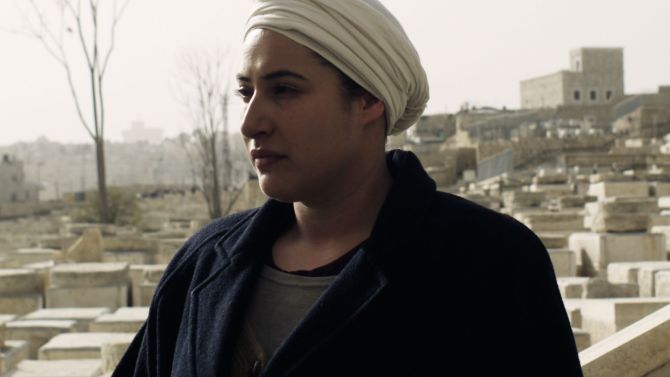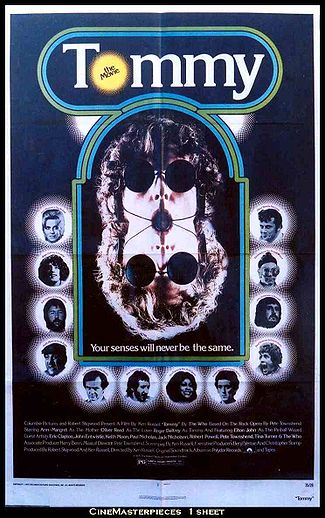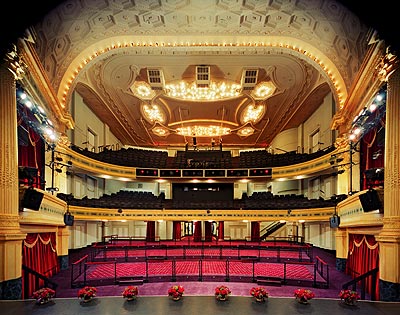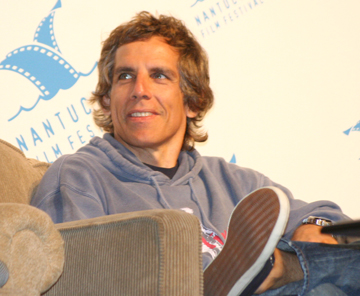|
|
||
|
Pro Tools
FILMFESTIVALS | 24/7 world wide coverageWelcome ! Enjoy the best of both worlds: Film & Festival News, exploring the best of the film festivals community. Launched in 1995, relentlessly connecting films to festivals, documenting and promoting festivals worldwide. Working on an upgrade soon. For collaboration, editorial contributions, or publicity, please send us an email here. User login |
Yaelle Kayam's "Mountain": Grave Matters at New Directors/New Films
The setting of Yaelle Kayam’s Mountain is Jerusalem’s Mount of Olives. This is where, according to Jewish and Christian scriptures, the Messiah will arrive on the Day of Judgment and resurrect the dead. This is also the unlikely spot where our heroine (Shani Klein) and her Yeshiva teacher husband, Reuven (Avshallom Pollack), are raising four young children in the Orthodox Jewish tradition. Tzvia – if that’s indeed her name – is herself a dense mass looming over the landscape. A full-bodied woman with sensuous features, she goes about her daily life with a haunted restraint, straddling both an archetype of vulnerability and a fathomless enigma. We feel for her. Here among the millennia-old burial ground, she’s dying a slow emotional death. Reuven’s work increasingly keeps him away from home, with his physical absence only enacting the void that now separates his heart from hers. It’s bad enough that he routinely snubs her in conversation, but the ultimate affront comes when she preps for the first permissible sex in a half a month, following her period and the ritual mikvah bath, only to be unseduced and abandoned. “Who’d want to touch you?” scoffs a prostitute at the sight of Tzvia’s bulky frum clothes and headscarf that she wears when venturing beyond her husband’s gaze. The booze-swilling sex worker is one of a host of shady characters who transact their illicit business in the cemetery at night to Tzvia’s growing fascination. So much so that she starts bringing them home-cooked meals as a payment of sorts for her peeping. A desperate loneliness, rather than any smarmy prurience, fuels these voyeuristic nocturnal wanderings that bring a pulse of life to her buried soul. Hovering ironically over the proceedings are the ancient graveyard history and the holy traditions of redemption that link it to the nearby Temple Mount (including Islam, which envisions a bridge to Al-Aqsa). In her director's statement, Kayam notes that she also drew inspiration from the Talmudic story of Rabbi Hiyya, whose wife tries to revive his flagging desire. It seems Kayam was especially intrigued by the interpretations of the ancient rebbetzen as a shrew, or a "contentious woman." The devout Jewess at the center ofMountain accepts her subservient role until she opts to take fateful action. Was the filmmaker additionally thinking of Lilith, who turns up in Jewish legend as a force of darkness and destruction?
A sense of the elegiac hangs over Mountain from the beginning, but death takes on a more pronounced presence through the verses of the Israeli poet Zelda Schneersohn Mishkovsky. Drawn to her grave like a pilgrim, Tzvia delves into what we assume to be a frayed old bible, but which turns out to be an anthology of Zelda’s work. In a particularly affecting scene, Tzvia reads one of the poems to Abed (Haitham Ibrahem Omari), a Palestinian graveyard custodian who may be the only character in the film to treat Tzvia with human empathy and interest. This despite the psychic wounds and desires that Klein’s stunning naturalistic performance and DP Itay Moram’s sensitive lensing show oozing from her very being. Tzvia’s interior states seep into the environments she inhabits. Inside the family’s cave-like stone home, cooler shadows prevail. Just outside, Halakhically separated by a wire fence, the tombs bake in bone-white sunlight or glow with eerie mystery in the black of the night. Kayam flirts with moments of melodrama and spurns them. Whether the jolting climax comes off as gratutious or earned, Mountain is as close as most of us will ever get to glimpsing the intimate realm of a devout Jewish woman, however unkosher her kitchen. Mountain is a selection of the 2016 New Directors/New Films festival presented by the Film Society of Lincoln Center and the Museum of Modern Art. 11.03.2016 | Laura Blum's blog Cat. : Mount of Olives mountain New Directors/New Films Shani Klein Yaelle Kayam Independent
|
LinksThe Bulletin Board > The Bulletin Board Blog Following News Interview with EFM (Berlin) Director
Interview with IFTA Chairman (AFM)
Interview with Cannes Marche du Film Director
Filmfestivals.com dailies live coverage from > Live from India
Useful links for the indies: > Big files transfer
+ SUBSCRIBE to the weekly Newsletter Deals+ Special offers and discounts from filmfestivals.com Selected fun offers
> Bonus Casino
User imagesAbout Laura BlumThe EditorUser contributions |































